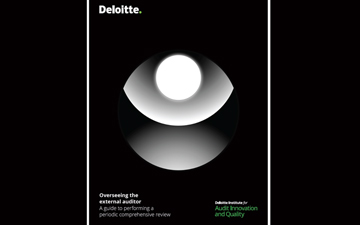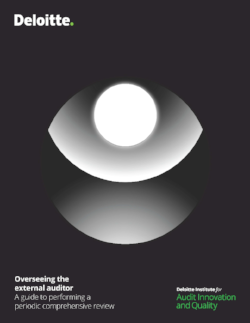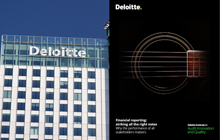Deloitte Canada promotes auditor review to audit committees

A uniquely Canadian solution to the threats posed by the long tenure of some external auditors
TORONTO, July 13, 2018 – Audit committees should conduct an unbiased and thorough evaluation of external auditors says a new report from Deloitte Canada. “Overseeing the external auditor - A guide to performing a periodic comprehensive review,” from the Deloitte Institute for Audit Innovation and Quality, provides audit committees with an overview of the evaluation process, questions to ask and a project manager’s checklist.
A periodic review of the external auditor is a uniquely Canadian approach, according to the report, to the “potential familiarity and self-interest threats posed by the long tenure of an external auditor.”
In 2016, the European Union imposed mandatory audit firm rotation rules, requiring listed companies in Europe to appoint a new auditor at least every 20 years and to tender these contracts every decade. In 2017, the U.S. Securities and Exchange Commission approved a new standard from the the Public Company Accounting Oversight Board (PCAOB) requiring the disclosure of auditor tenure in the auditor’s report.
In 2013, CPA Canada and the Canadian Public Accountability Board introduced the Enhancing Audit Quality initiative, which including the Periodic Comprehensive Review of the External Auditor, recommending that audit committees “should conduct a comprehensive review of external auditors at least every five years, to provide a deeper and broader analysis of external auditor performance than an annual assessment.”
 |
Overseeing the external auditor - A guide to performing a periodic comprehensive review, Deloitte Canada 2018. |
Deloitte Canada provides guidance for the review process
In a recent interview with Canadian Accountant, Brian Hunt, the now-retired former head of CPAB, acknowledged that audit committees are expected to do more than they have in the past. “Whether you’re a director at an audit committee or at a firm, how do you assess or measure audit quality? Directors of audit committees and the auditors have a role to play in coming up with a quality audit.”
According to Deloitte Canada, “The expectation of external stakeholders to thoroughly evaluate the external auditor is on the rise. There’s an emerging trend in the U.S., more so than in Canada, to challenge audit committees on their selection of an audit firm, often triggering discussions about long-tenured audit firm’s familiarity with a company and its ability to be objective and exercise appropriate professional skepticism.”
The Deloitte Canada report suggests that a comprehenive review should take eight to 12 weeks to complete, and provide the auditor with sufficient time to address any feedback before the next audit cycle. As a review may lead to a change in external auditors and a request for proposals from audit firms, “it’s important to know the date by which shareholders would need to approve the auditor appointment.”
The questions audit committees should always consider asking are:
1. How long has the audit firm been the external auditor? What steps have been takento address possible institutional familiarity threats?
2. What are the firm’s plans for the training and development of the engagement team?
3. What are the firm’s expectations as to future partner rotation or other changes tosenior engagement team personnel?
4. How are the size, resources, and geographical coverage of the audit firm changing?
5. What efforts are being made to enhance audit quality within the audit firm generally,and the external audit of the entity specifically?
6. How has the audit firm’s relevant expertise in the industries and markets in whichthe entity operates been evolving? What are the audit firm’s future plans to servethe entity with an engagement team with appropriate expertise?
7. How has the firm considered systemic audit-quality issues identified by CPAB in itspublic reports?
8. What reputational challenges, if any, are facing the audit firm and how are thesebeing addressed?
The report also includes a section on questions committees may want to consider, developing questions for other stakeholders, and a project manager’s checklist. “Overseeing the external auditor - A guide to performing a periodic comprehensive” can be accessed here. CPA Canada’s “Periodic comprehensive review of the external auditor: Tool for audit committees” is also available for download.
Colin Ellis is managing editor of Canadian Accountant.









(0) Comments